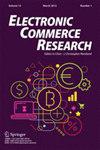西方的电子商务食品选择:比较企业对消费者、线上对线下食品配送服务和点击取货服务
IF 4.7
4区 管理学
Q2 BUSINESS
引用次数: 0
摘要
本研究旨在探讨通过三种电子商务模式促进食品消费的重要因素:企业对消费者、线上对线下食品配送服务以及点击付款(Click & Collect)三种电子商务模式。在新西兰、英国和丹麦进行的在线调查共收集了 1,461 个样本。数据分析采用了描述性分析和有序逻辑回归法。总体而言,消费者使用电子商务进行食品消费的频率受到社会人口统计学、电子商务食品选择动机、创新采用特征和电子服务质量属性的显著影响。本文章由计算机程序翻译,如有差异,请以英文原文为准。
E-commerce food choice in the west: comparing business-to-consumer, online-to-offline food delivery service, and click and collect
This study aims to explore the significant factors driving food consumption through three e-commerce modes: Business-to-Consumer, Online-to-Offline Food Delivery Service, and Click & Collect in developed Western 98countries. A total of 1,461 samples were collected through online surveys in New Zealand, the United Kingdom, and Denmark. Descriptive analysis and ordered logistic regression were employed for data analyses. Overall, consumers’ food consumption frequencies with e-commerce were found to be significantly influenced by several socio-demographics, e-commerce food choice motives, innovation-adoption characteristics and e-service quality attributes.
求助全文
通过发布文献求助,成功后即可免费获取论文全文。
去求助
来源期刊

Electronic Commerce Research
Multiple-
CiteScore
7.50
自引率
12.80%
发文量
99
期刊介绍:
The Internet and the World Wide Web have brought a fundamental change in the way that individuals access data, information and services. Individuals have access to vast amounts of data, to experts and services that are not limited in time or space. This has forced business to change the way in which they conduct their commercial transactions with their end customers and with other businesses, resulting in the development of a global market through the Internet. The emergence of the Internet and electronic commerce raises many new research issues. The Electronic Commerce Research journal will serve as a forum for stimulating and disseminating research into all facets of electronic commerce - from research into core enabling technologies to work on assessing and understanding the implications of these technologies on societies, economies, businesses and individuals. The journal concentrates on theoretical as well as empirical research that leads to better understanding of electronic commerce and its implications. Topics covered by the journal include, but are not restricted to the following subjects as they relate to the Internet and electronic commerce: Dissemination of services through the Internet;Intelligent agents technologies and their impact;The global impact of electronic commerce;The economics of electronic commerce;Fraud reduction on the Internet;Mobile electronic commerce;Virtual electronic commerce systems;Application of computer and communication technologies to electronic commerce;Electronic market mechanisms and their impact;Auctioning over the Internet;Business models of Internet based companies;Service creation and provisioning;The job market created by the Internet and electronic commerce;Security, privacy, authorization and authentication of users and transactions on the Internet;Electronic data interc hange over the Internet;Electronic payment systems and electronic funds transfer;The impact of electronic commerce on organizational structures and processes;Supply chain management through the Internet;Marketing on the Internet;User adaptive advertisement;Standards in electronic commerce and their analysis;Metrics, measurement and prediction of user activity;On-line stock markets and financial trading;User devices for accessing the Internet and conducting electronic transactions;Efficient search techniques and engines on the WWW;Web based languages (e.g., HTML, XML, VRML, Java);Multimedia storage and distribution;Internet;Collaborative learning, gaming and work;Presentation page design techniques and tools;Virtual reality on the net and 3D visualization;Browsers and user interfaces;Web site management techniques and tools;Managing middleware to support electronic commerce;Web based education, and training;Electronic journals and publishing on the Internet;Legal issues, taxation and property rights;Modeling and design of networks to support Internet applications;Modeling, design and sizing of web site servers;Reliability of intensive on-line applications;Pervasive devices and pervasive computing in electronic commerce;Workflow for electronic commerce applications;Coordination technologies for electronic commerce;Personalization and mass customization technologies;Marketing and customer relationship management in electronic commerce;Service creation and provisioning. Audience: Academics and professionals involved in electronic commerce research and the application and use of the Internet. Managers, consultants, decision-makers and developers who value the use of electronic com merce research results. Special Issues: Electronic Commerce Research publishes from time to time a special issue of the devoted to a single subject area. If interested in serving as a guest editor for a special issue, please contact the Editor-in-Chief J. Christopher Westland at westland@uic.edu with a proposal for the special issue. Officially cited as: Electron Commer Res
 求助内容:
求助内容: 应助结果提醒方式:
应助结果提醒方式:


